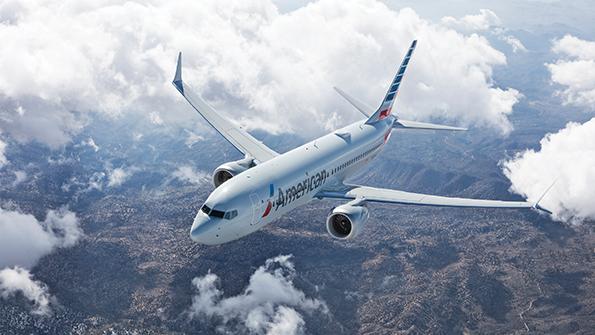2023 ATW ECO-Airline of the Year: American Airlines

American Airlines Boeing 737 MAX 8
American Airlines CEO Robert Isom likes to describe his company’s sustainability philosophy as an “all-of-the-above” approach, meaning it is about actively incorporating sustainability at every level.
American’s environmental, social and governance (ESG) strategy is focused on the issues that are most important to the company and its stakeholders, and as such, they cover a broad span of initiatives.
“We have developed an integrated and transparent approach to ESG management, measurement and reporting. That said, there’s always room for improvement, and we continue to look to best practices within and outside our industry as we refine and strengthen our policies, practices and disclosures,” American says.
Fuel conservation practices are a key part of American’s multifaceted sustainability strategy. These include replacing older aircraft with newer, more fuel-efficient models. Since 2013, American has invested more than $24 billion in fleet modernization and taken delivery of more than 600 new aircraft that include the Airbus A321neo, Boeing 737 MAX and Boeing 787. The average fleet age is now 11 years, making it the youngest among US legacy carriers, with a fuel efficiency 10% better than in 2013.

In addition, American has increased ground operational efficiency, reduced excess weight, and optimized flights plans and procedures to both reduce fuel use and lower emissions.
With sustainable aviation fuel (SAF), American has set a goal of replacing 10% of its jet fuel with SAF by 2030. Current purchase commitments cover more than 620 million gallons of SAF between 2025 and 2030. In 2020, American was the only member of Airlines for America (A4A) to report using more than 1 million gallons of SAF—a number it doubled to more than 2 million gallons in 2022.
American is an anchor partner in Breakthrough Energy Catalyst, which aims to accelerate decarbonization efforts by investing in new technologies, including SAF development and production. American has committed to invest $100 million in this effort with other partners that include Bank of America, BCG, BlackRock and General Motors.
American is also supporting the development of new zero-carbon propulsion technologies through investments in ZeroAvia, a specialist in hydrogen-electric aviation, and Universal Hydrogen, which is building a green hydrogen distribution and logistics system for aviation.
On the ground, American has implemented changes such as new approaches to gating that maximize on-time arrivals and reduce ramp congestion. This is saving some 870,000 gallons of fuel at the company’s Dallas-Fort Worth (DFW) home hub alone, equal to more than 2,600 tonnes of carbon dioxide. Across its whole operations and combined with other updated procedures, the airline is saving 60,000 tonnes of CO2 per year. The airline is increasing use of single-engine taxi operations, reducing emissions by up to 40%.
The company also operates green buildings, saving some 750,000 gigajoules of electricity from renewable resources for its DFW headquarters, where a new campus replaced 21 acres of concrete surfaces with water-efficient landscaping and 3,000 trees.
American’s carbon offset program through nonprofit provider Cool Effects offers customers the option to calculate the emissions of their flight and purchase high-quality offsets. Customers can also use points to redeem offsets. In addition, the company has sold over 6 million gallons of SAF emissions reductions to corporate customers.
Partnerships
Partnerships are another important part of American’s sustainability strategy. Through the oneworld global alliance, American has SAF agreements with Gevo, for over 600 million gallons, and Aemetis, for more than 350 million gallons. American has also partnered with federal agencies like NASA and FAA to test an air traffic control program, called the Terminal Flight Data Manager, which is designed to improve the predictability and efficiency of departure operations. American ran a pilot trial alongside NASA at Charlotte Douglas International Airport in North Carolina, saving more than 1.1 million gallons of fuel and 11,600 tonnes of CO2. FAA is in the process of implementing the program at almost 90 airports.
This project was awarded the Maverick Award for Sustainability in 2022, presented jointly by the US Air Traffic Control Association, the Civil Air Navigation Service Organization and the World ATM Congress.
In its determination to think broadly about safeguarding Earth’s resources, American has increased the sustainable food options onboard, adding options that are sustainably sourced and waste conscious. American was also the first US carrier to join United for Wildlife, an initiative of the Royal Foundation that aims to prevent and end illegal wildlife smuggling and trafficking.
It is no surprise, given the extent and depth of its sustainability initiatives, that American became the first airline in the world to receive validation for its 2035 immediate carbon reduction target from the Science Based Targets Initiative. And that the airline appeared on the Dow Jones Sustainability North America Index in 2021 and 2022, improving its score by more than 20% year-over-year.
The 2023 ATW Eco-Airline of the Year is American Airlines.




